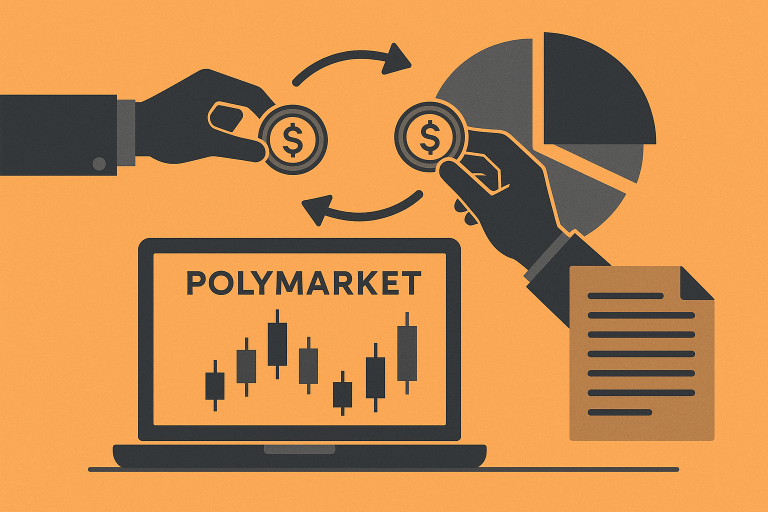Key Takeaways
- A Columbia University study found that approximately 25% of Polymarket’s trading activity over three years was artificially inflated by wash trading.
- About 14% of wallets exhibited behavior consistent with coordinated wash trading, peaking at 60% in December 2023 and dropping to 5% by May 2024.
- The study linked spikes in artificial trading to rumors of a potential Polymarket token launch, suggesting traders sought airdrop eligibility.
- Despite regulatory scrutiny and past settlements, institutional interest remains, with ICE planning significant investment in Polymarket.
Columbia Study Reveals Wash Trading Inflates Polymarket Activity
A recent study conducted by researchers at Columbia University indicates that nearly a quarter of all trading on Polymarket, a prominent decentralized prediction platform, has been artificially inflated by wash trading over the past three years. Utilizing blockchain analytics on the Polygon network, the researchers identified significant patterns of self-dealing that skewed metrics for market depth and liquidity.
These findings cast doubt on the perceived transparency of blockchain-based prediction markets and highlight broader concerns about maintaining integrity in decentralized finance (DeFi) without traditional oversight.
Algorithmic Analysis Uncovers Trading Manipulation
The research team meticulously analyzed millions of wallet transactions recorded on the Polygon blockchain, which are publicly verifiable. By developing algorithms designed to detect repetitive and circular trading patterns, they identified that 14% of Polymarket’s 1.26 million wallets displayed characteristics of wash trading.
These specific wallets frequently transacted with each other, with minimal engagement in the broader market, suggesting manipulative self-dealing rather than genuine speculative activity.
According to the study, wash trading constituted, on average, 25% of Polymarket’s total transactions since 2021. The prevalence of this artificial activity varied, reaching a high of 60% in December 2023, followed by a decrease to around 5% by May 2024, and then an increase to approximately 20% by October 2024.
This highlights the vulnerability of decentralized markets to manipulation, particularly when transaction costs are negligible and user identities are pseudonymous.
The study’s authors, including professors from Columbia Business School and an economist from Barnard College, noted that their estimates are not definitive. However, the consistent patterns observed raise significant questions about the accuracy of on-chain market data in representing genuine sentiment and liquidity.
Token Speculation May Have Fueled Artificial Activity
While the study did not directly implicate Polymarket itself, it identified structural elements that facilitate wash trading. The platform’slack of transaction fees, support for self-custodied crypto wallets, and stablecoin settlements enable traders to operate numerous pseudonymous accounts at minimal cost.
The researchers also observed a correlation between several surges in artificial trading volume and rumors surrounding a potential Polymarket token launch. In the DeFi space, such speculation can incentivize traders to inflate their activity to qualify for potential airdrop rewards upon a new token’s release.
Polymarket founder Shayne Coplan alluded to a possible token launch on social media in early October, coinciding with one of the significant increases in wash trading activity. This timing further suggests that some trading was driven by the pursuit of prospective reward distributions rather than market insight.
Allen Sirolly, one of the study’s authors, pointed out that authentic trading volumes typically increased in response to real-world events like election polls or sports results. In contrast, the peaks in wash trading aligned more closely with token-related speculation, indicating a different user motivation.
Regulatory Context and Industry Competition
Founded in 2020, Polymarket has emerged as a leading blockchain-based prediction platform, enabling users to wager on various political, financial, and cultural outcomes. Its primary competitor, Kalshi Inc., operates under U.S. regulation but does not utilize blockchain technology, limiting external scrutiny of its transaction data.
The timing of this report is particularly noteworthy. In 2022, Polymarket settled with the Commodity Futures Trading Commission (CFTC) for $1.4 million due to operating an unregistered exchange, consequently barring U.S. users. Despite this regulatory challenge, Polymarket continues to attract institutional investment.
Intercontinental Exchange Inc. (ICE), the owner of the New York Stock Exchange, has expressed intentions to invest up to $2 billion in Polymarket. This significant interest underscores the mainstream financial industry’s growing attention to blockchain-based prediction markets.
Expert Summary
A Columbia University study reveals that a substantial portion of Polymarket’s trading volume is artificial, driven by wash trading tactics. While the platform’s structure facilitates this, speculation around potential token launches appears to be a key motivator. Despite past regulatory actions, institutional interest, notably from ICE, signals continued mainstream financial engagement with prediction market technology.

